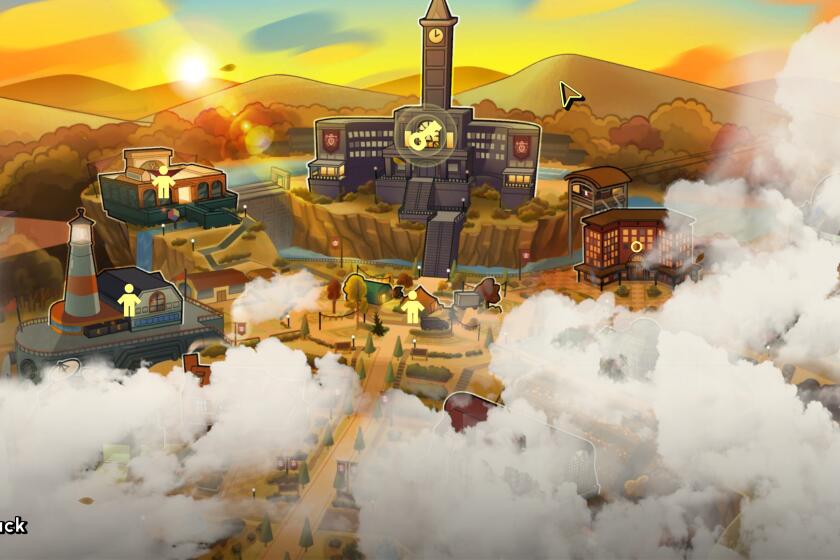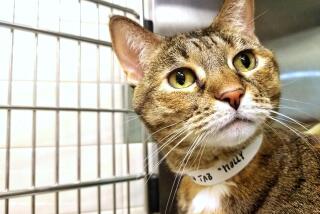Review: ‘Stray’ video game argues that sci-fi dystopia is better with cats
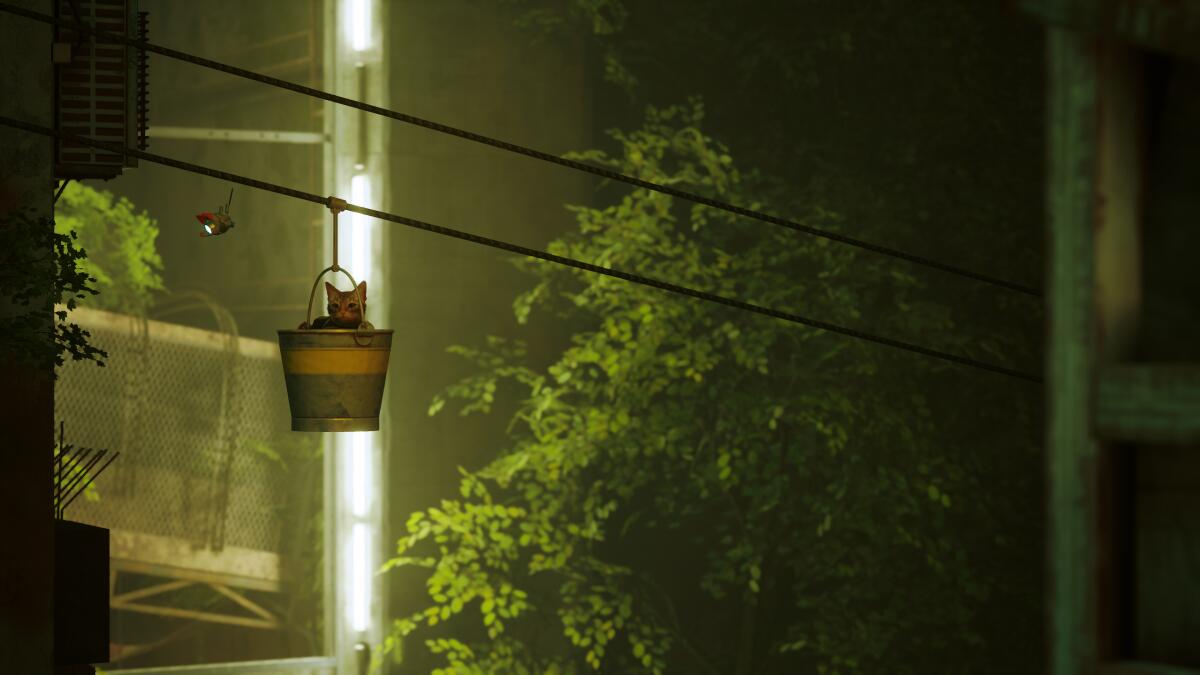
- Share via
“Stray” was announced in summer 2020, and shortly thereafter it colloquially became known as “the cat game.”
After spending nine hours with and completing “Stray” — sorry, the cat game — I can confirm the following:
- You can, as a cat, make biscuits.
- A cat traveling throughout an underground city in a bucket affixed to a rope is as adorable as it sounds.
- There is a puzzle that involves meowing, and one button on the controller is dedicated solely to meowing. Meow often.
- It is a joy to knock things over as a cat. This also solves a puzzle.
- Sometimes you can just listen to music and sleep.
- Other times you can curl up on a robot’s tummy, and its computerized face flashes a digital heart.
“Stray” is a cat lover’s dream. Cats, those household pets that still double as the king of online memes, have of course been given the video game treatment before — narrative adventure “Night in the Woods” or mobile platform game “Super Phantom Cat” among them. And yet I can’t recall a game that treats cats, in this case a spry orange feline, with as much reverence as “Stray.” Though bearing a sci-fi dystopian setting, “Stray,” from French firm BlueTwelve Studio, works hard to capture cat movements, cat behavior and cat idiosyncrasies, even down to its themes — a mixture of loyalty, independence and personal rebellion.
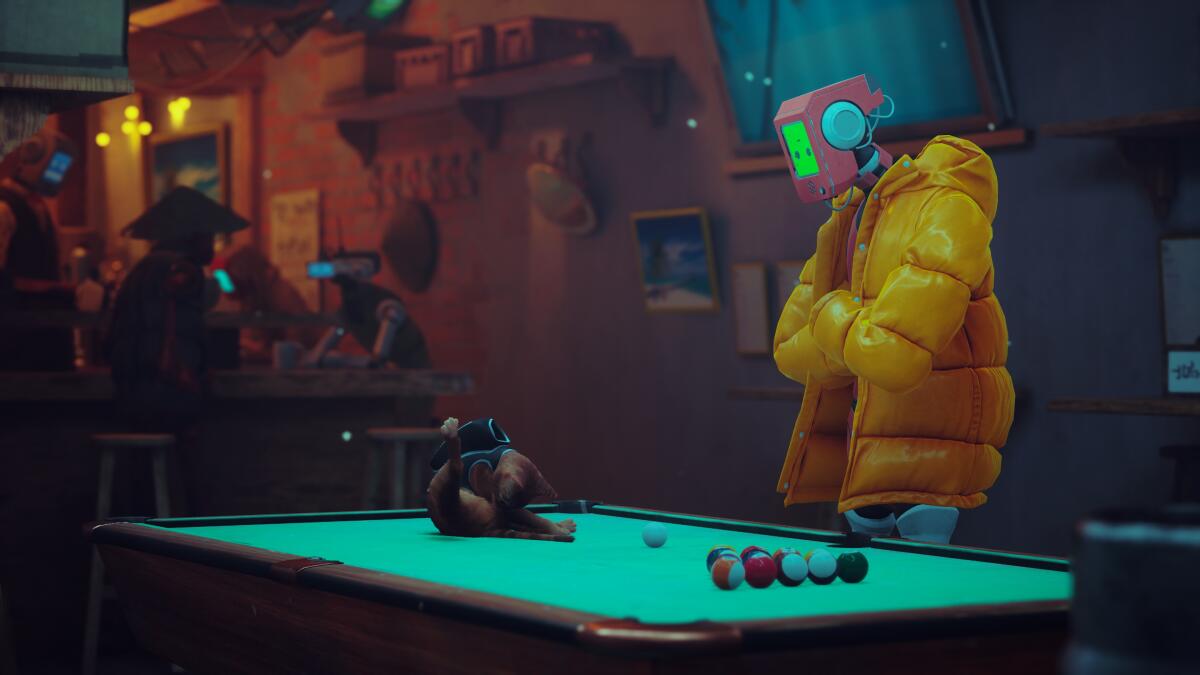
The game, available for PlayStation consoles and PCs, nods to bigger-picture ideas. There are hints of a plague that wiped out humanity (thus it’s 2022 topical). Largely good-natured robots, apparently once designed to be subservient to humans, are torn between following the status quo or taking part in an insurrection. The glory of nature, and its preservation — or lack thereof — is a central fixation, as a wrecked environment has led to the creation of one-eyed mutated vermin that eat most everything in their sight, including robotic metal and furry kitty cats.
These ideas are glanced at rather than hammered into the player’s mindset. Many robots are scared of the outdoors, believing humanity left it uninhabitable before the species died off. But the game begins with the cutest tutorial I have ever played. We are just an orange cat frolicking in a field with buddies, even at one point rubbing against and licking our black-cat pal. Whatever effects climate change had, eventually cats survived. While there aren’t glimpses of other familiar animals, we take it for granted that cats — the little invasive species with occasional bratty tendencies — are one of the mammals that endured an apocalypse.
That’s good for us, as playing as a cat in “Stray” is a joy. The game is mostly exploration and puzzle solving as we run around an underground city loosely modeled after Hong Kong’s fortress-like Kowloon Walled City, one where stars are digitized and nearly busted monitors play static-infused images of the outside world. The puzzles mostly involve helping the robot denizens of “Stray’s” world — finding sheet music for a busker, or trading electrical cables for a poncho. “Stray” encourages us to linger and to enjoy the cat life. Whenever our robot musician would play a song, I would instruct the game’s cat to curl up on a pillow and would set the controller down.
Locals Coin Crew Games and iam8bit combine forces to release “Escape Academy,” a digital escape room game that puts the emphasis on group play. It’s a delight.
There are some tense moments. Those come from avoiding the so-called Zurks, those one-eyed sewer-dwelling rodents that can tear us apart. We do this by running and jumping rather than pure fighting (we do get a simple light-based weapon at one point), and later our feline pal will have to stealthily avoid the surveillance state. I found these action-game overtures just the right amount of challenging, and thankfully they largely stay true to cat behavior — that is, we run, sneak and duck into cardboard boxes and tiny crevices. We also scratch couches and pull apart computer wires, the latter part of destroying a security system.
I feel it’s important to note that when it comes to playing “Stray,” I am biased. I am a cat owner, and relatively obsessed with my 12-year-old feral black cat. And “Stray” does an excellent job at forging a connection between player and digital cat.
At the start, we are among cat friends and living what appears to be a leisurely nomadic life. That is until a jump goes wrong and our cat goes tumbling into an underground city with apparently no way out. The look on our video game cat’s face will tug at the heart of any cat owner, as we all know that cats, for as much as they value their independence, are pretty loyal companions at their core. Twice while writing this review, my own cat has pounced across the keyboard, which just so happens to be an action we take late in “Stray.”
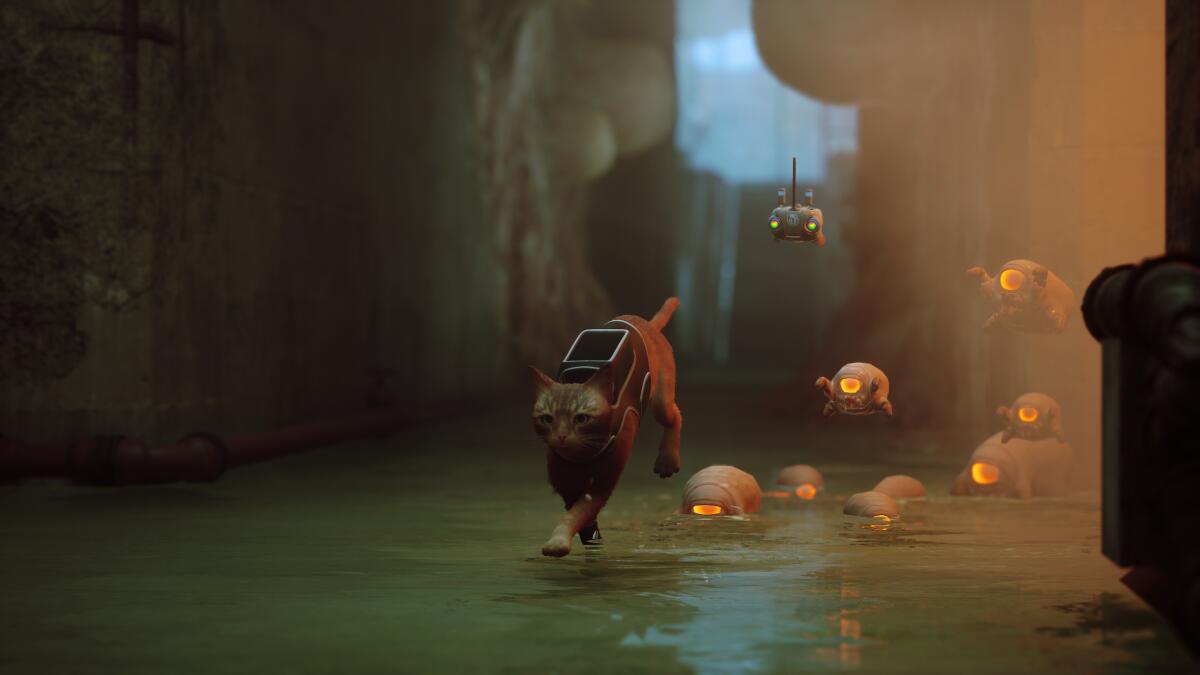
But once we tumble, we have the quest of the game, which is to go up, treating the Asian-inspired city — good fortune, beckoning cat maneki-neko figurines are a staple in nearly every robot household — as something of a giant cat tree. The goal is to climb through lower- and middle-class worlds and finally once again reach the triumph of the natural world.
But don’t be surprised if you want to hang out in “Stray’s” dystopian city. Jumping across neon signs and air conditioner units can lead us to rooftops, where we can discover hidden robot hideouts. We want to hang and talk to all the robots, be it those drunk and slouching in the bar or the frustrated laundromat owner who is tired of cleaning up paint outside his shop (our cat may be partly responsible for such a mess).
For much of the game, the robots are genial. We even have a little one as a companion — a little drone-like feller named B-12. The latter affixes to our back — at first causing our cat to moan and crouch and not want to walk — but B-12 is a helper bot, able to translate robot speech and render all sorts of objects as a mysterious collection of molecules that allow our cat to transport them around town. There’s an underlying mystery with B-12, and “Stray” is patient in unveiling its secrets, as with B-12 the quest shifts. We no longer just need to escape; we need to open the city roof. We discover this mission largely through conversation with robots throughout various underground locales — a hippie town in a sort of giant treehouse was my favorite.
The final act focuses heavily on stealth missions, rescuing some robot friends and even a prison escape. My favorite moments are torn between two — the aforementioned puzzle solved by meowing, or our cat taking control of a subway train. It all leads to a thoughtful ending, one that answers some questions, leaves some open and celebrates acts of resistance. What I remember most, though, is something B-12 says at one point to our cat: “You’re a good friend.” Such a sentiment is how I feel about “Stray” and its virtual orange feline I hope we see in further adventures.
"Stray"
More to Read
The biggest entertainment stories
Get our big stories about Hollywood, film, television, music, arts, culture and more right in your inbox as soon as they publish.
You may occasionally receive promotional content from the Los Angeles Times.
